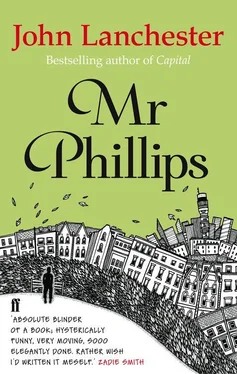‘Is this what it’s normally like here?’ Mr Phillips asks.
‘Noisier on Fridays, but basically,’ says Martin. ‘You’re going to ask how many of them are paying for themselves, aren’t you?’
‘I hadn’t been, but now that you’ve brought it up.’
‘Next to none.’
‘This is my treat, by the way,’ says Mr Phillips, who until that very moment has not thought of the question.
‘You sure? I could deduct you as a business adviser.’
‘I won’t hear of it.’
Their first courses arrive. Mr Phillips’s portion of bacon and scallops is on the small side but despite, or perhaps for some psychological reason because of that, is delicious. His son, always a very methodical eater, is dividing each of his ravioli in half before chewing and swallowing it.
‘How’s Tom?’
Martin always asks about Tom and always sounds both patronizing and friendly when he does so. To Mr Phillips, whose relationship with his sister is nothing like what it was when they were both children, it looks as if Martin and Tom will never entirely stop being older and younger brother. Odd to imagine them in their seventies or eighties, with Martin still having this edge over his kid sibling.
‘Asleep most of the time. The rest he divides between staying in his room playing horrible music and going out with his friends.’
‘Acne any better?’
‘No, not much.’
‘I was lucky mine was all on my back,’ says Martin meditatively, as if this were a very large question to which he belatedly realizes he hadn’t given sufficient thought. ‘So to what do I owe the pleasure? What brings you to this part of town?’
Mr Phillips, who has a mouthful of bacon and scallop, gestures with his fork while he swallows his mouthful.
‘… ing much, just happened to be passing by.’
‘At the risk of boasting, you’re lucky I can spare the time. Things are manic at the moment. We’re on the point of releasing two different dance compilations, negotiating a seventies revival album, and another one of cover versions. It’s mental.’
And this had seemed, from the atmosphere of Martin’s office, to be true. At the top of a flight of stairs in what would once have been a small town house but was now commercial flats over a sex shop, M Enterprises turned out to be a single room with four people in it, all of them simultaneously on the telephone. When Mr Phillips, who had never been to Martin’s office before, walked in, he was slightly out of breath from the climb up the stairs. He stood there feeling embarrassed while the three people who were not Martin looked at him without recognition. Then his son, who had been standing and looking out the window while talking on the phone, turned around and saw him. He raised his eyebrows and smiled but kept talking.
Martin is an even six feet, taller than Mr Phillips himself, and the shuffling of his and Mrs Phillips’s genes has given Martin black hair (from Mr Phillips), cheekbones (Mrs Phillips), grey eyes from, apparently, Mrs Phillips’s father (dead before they met) and a deceptively athletic figure — ‘deceptively’ because Martin, unlike his younger brother, disliked all exercise. Having worn deliberately rebellious clothes all through his school days, as ripped and unkempt as possible, he is now wearing a single breasted grey suit, dark blue shirt and rather subtle maroon tie, all of which make him look older. If he were not Mr Phillips’s son, Mr Phillips realizes, there would not have been the slightest chance that he and Martin could ever have met. And perhaps an equally small chance that they would have had anything to say to each other.
When he finally got off the telephone Martin said:
‘Dad! To what do I owe the pleasure? Dad — this is everyone. Everyone — this is Dad.’
The other people in the office, all of whom were still holding phones, raised a hand and nodded or made some other gesture of recognition without stopping what they were doing. Two of them were unusually pretty girls. The effect was not so much of deliberate rudeness but of an attempt at politely suppressing their curiosity. It was one of those moments when Mr Phillips feels like an alien, like a spy, or like someone who has adopted a cover story so successfully that he is beginning to forget who he is or used to be. His uniform of class and profession seemed baggy, as if he could slip out of it at any moment with a single convulsive wriggle; while at the same time he could feel his stomach pressing against his belt buckle, asking that it be let out another notch. He has a memory of his father putting on blue overalls and contentedly going off to work with his bag of tools and pipe — he had loved his electrician’s costume, had taken great comfort from it. What would we do without uniforms?
Mr Phillips sometimes feels that other men have something he doesn’t have and — he has to conclude, as he gets stuck into his sixth decade — will never have. This is the carapace which grows or solidifies around them as they get older, and which involves an increasing lack of uncertainty about, or interest in, anything they don’t already know (‘know’ being defined as something like ‘feel that they have fully comprehended, to their own satisfaction’). Mr Mill, for instance, Mr Phillips’s former head of department, has a hardness to him, a rigidity, that is nothing to do with determination or resolve or strength of character or anything other than a philosophical impermeability, a thick skin. Nothing new is ever likely to reach him. Told about a development in corporate procedures that would affect hundreds of his colleagues but not him — a new way of calculating overtime rates, say, which would cost most of them £500 a year, but about which they were prevented from striking by fresh government legislation, crashed though Parliament in a specific attempt to alter practices at Wilkins and Co. — he would, once he had established that the change had no direct effect on him, stop paying any attention. He would react with the polite but obdurate impassivity of a Catholic cardinal temporarily trapped into sitting next to a UFO enthusiast at a wedding reception. To Mr Phillips this is not admirable, but it is enviable.
Mr Phillips’s father had that carapace. Something inside him had sunk and retreated. There was a wariness. His solitariness and holding back always made him alien, a stranger; and perhaps electricians as a profession have something reserved about them, the caution of men used to dealing with a far larger power which was always capable of administering nasty surprises. Any plan or intention of the young Mr Phillips — a plan to travel to watch Crystal Palace play away from home, go to a friend’s party or to the cinema, his initial announcement of wanting to stay on at school and do Alevels, the subsequent announcement that he wanted to be a chartered accountant, his first visit to the bank to borrow money to buy a car, even his heading into the kitchen to offer token help to his mother — was greeted with the words, ‘Why do you want to do that?’ — not so much a question as a disrecommendation or even a warning. The caution came across as a kind of hardness. Martin, at twenty-five, was already starting to grow his own more modern brand of the same thing.
‘Do you have any plans for lunch?’ Mr Phillips asked his son and then, suddenly quailing at the thought of being alone with him, said, ‘And of course if any of your colleagues …’
‘They’re all too busy,’ said Martin. ‘And so would I be if that prat from Aand J records hadn’t stood me up. Thanks. I’d love to. There’s a place I go to a lot, and might be able to score us a table even though we haven’t booked. I’ve just got a couple of calls to make. Have a sit down and I’ll be with you in two ticks.’ Although Martin would not have wanted his father to notice that he was trying to impress him, he noticed it nonetheless. One of the surprising things about Martin was that he was in many respects still rather young.
Читать дальше




![Unknown - [Carly Phillips] The Bachelor (The Chandler Brothe(Bookos.org) (1)](/books/174132/unknown-carly-phillips-the-bachelor-the-chandle-thumb.webp)







